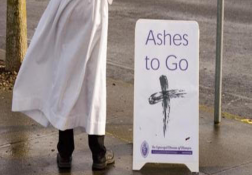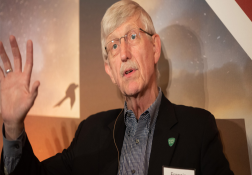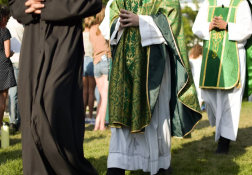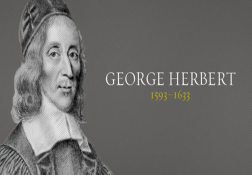You are here
 March 03 2022
Ashes to Go plus glitter equals Glitter+Ash Wednesday
March 03 2022
Ashes to Go plus glitter equals Glitter+Ash Wednesday
But Ash Wednesday has a powerful draw bringing thousands of people to church who would usually not go otherwise for the Imposition of Ashes.
The Ash Wednesday tradition was apparently started by Pope Gregory the Great who was Bishop of Rome from 590 to 604 AD. He is also credited with sending St. Augustine of Canterbury to England to evangelize the Anglo-Saxons in 595 AD. Two years later in 597 AD Augustine was named the first Archbishop of Canterbury.
Read more February 28 2022
Anglican Evangelicalism: Reclaiming Our Allies: Poet's Corner Part Three
February 28 2022
Anglican Evangelicalism: Reclaiming Our Allies: Poet's Corner Part Three
Edmund Spenser was once secretarial assistant to the Calvinistic Bishop of Roches-ter, John Young, and upheld the doctrines of grace and endorsed their great ex-ponent Edmund Grindal in his majestic poesy in such works as The Fairy Queen and the Shepherd's Calendar:
The Fairy Queen, Book 1, Canticle X - Her faithful knight fair Una brings to House of Holiness, where he is taught repentance, and the way to heavenly bliss.
Read more February 19 2022
Francis Collins on COVID-19 politics: 'The culture war is literally killing people'
February 19 2022
Francis Collins on COVID-19 politics: 'The culture war is literally killing people'
"And yet they are still not seen as something that a lot of white evangelicals are interested in taking part in and, as a result, people are dying. I just didn't see that happening and certainly not at this scale."
Read more February 15 2022
One-stream Anglicanism
February 15 2022
One-stream Anglicanism
One-stream Anglicanism is completely at home with traditional worship and practice. The 16th century English reformers were crystal-clear that the Bible is primary (sola Scriptura), while maintaining a high regard for how it has been interpreted over time (i.e. tradition). Reading the reformers is like reading Scripture through the glasses of the esteemed church fathers.
Read more February 15 2022
Wonders of the Living World: Alister McGrath -- exploring the landscape
February 15 2022
Wonders of the Living World: Alister McGrath -- exploring the landscape
I became a scientist because of my sense of wonder at the beauty and immensity of the world. I felt that I was about to begin a journey of discovery which would answer all my great questions about life and the universe. I had no idea where this excitement about the beauty of the world would lead me. I just knew it would be worthwhile and satisfying.
Can you tell us a bit about your faith journey?
Read more February 04 2022
The Unforgiveable Sin
February 04 2022
The Unforgiveable Sin
I will harden Pharaoh's heart, and though I multiply my signs and wonders in the land of Egypt, Pharaoh will not listen.
(Exodus 7:3-4a)
This idea of spiritual deafness is similar to Isaiah's prophecy, (Isaiah 6:9-10; Acts 28:26-27), repeated later by Jesus in Matthew 13:9-17.....
Read more February 03 2022
New Frontiers in Politically Correct Bible Translation
February 03 2022
New Frontiers in Politically Correct Bible Translation
Scripture scholars, whether of the dynamic equivalence or formal equivalence school of translation, usually strive to give the sense of the original meaning of the text. Most major English translations are not trying to skew the text for ideological reasons. But there have been exceptions. And one of those exceptions now appears to be the canary in the coal mine.
Read more January 06 2022
Roman Catholicism as a "temptation" for evangelical theology
January 06 2022
Roman Catholicism as a "temptation" for evangelical theology
In Mohler's view, present-day evangelical theology faces these temptations: fundamentalism, atheism, Roman Catholicism, and liberalism. These words are not to be taken lightly; the trajectory of evangelical theology has not always been peaceful.
What is interesting is to understand the main dangers surrounding it. Let me briefly comment on three temptations and then focus on Roman Catholicism.
Fundamentalism, atheism and Protestant liberalism
Read more January 03 2022
ANGLICAN EVANGELICALISM: RECLAIMING OUR ALLIES: PART TWO
January 03 2022
ANGLICAN EVANGELICALISM: RECLAIMING OUR ALLIES: PART TWO
The language we use in our relationship with the Lord may range and alternate from the ordinary to the majestic in the speech of those who adore him according to either their natural characteristic of plain communication in everyday circum-stances, or the cultivated language of studied and creative art. Both methods of speaking of or to God have their place, if reverent, trustful, affectionate and humble.
Read more December 28 2021
Will We Be Able to Sin in Heaven?
December 28 2021
Will We Be Able to Sin in Heaven?
Here are eight considerations in regard to this question that can put our fears to rest:
1. On this fallen earth, we do not have the perspective of heaven, which makes it difficult to imagine being in a state where the capacity to sin - even the idea of it - no longer exists.
In Ephesians 1:17-19, the Apostle Paul set the record straight .....
Read more


